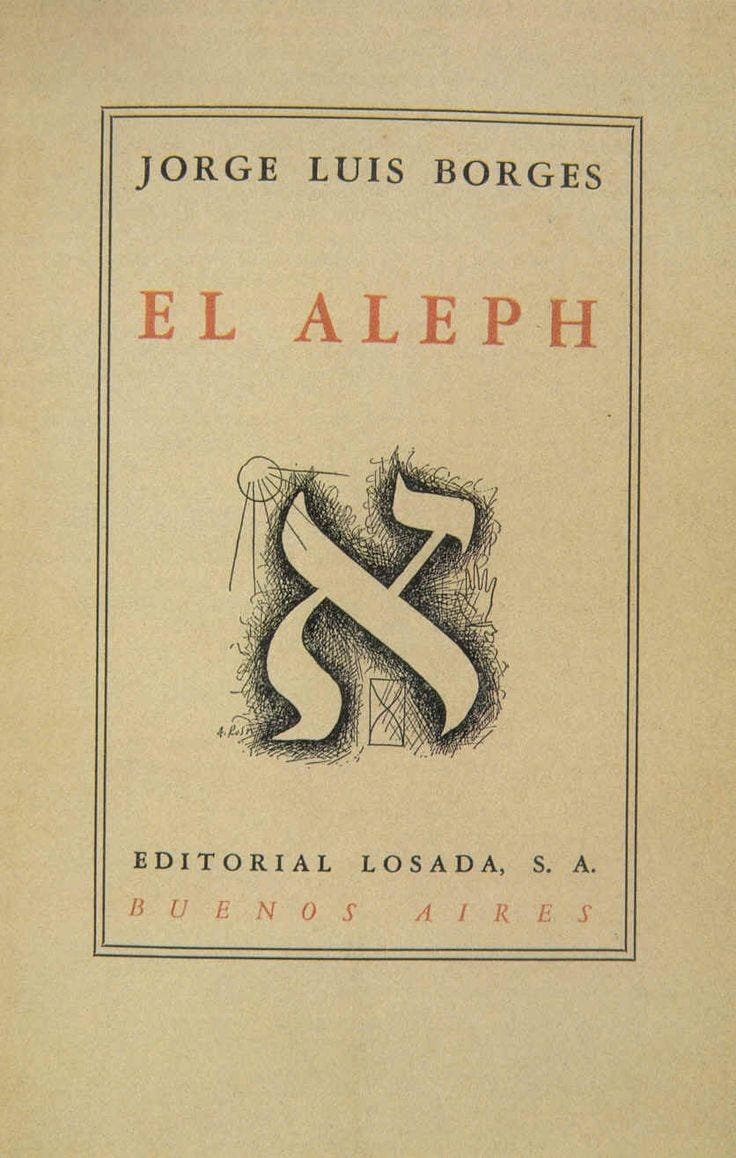Table of Contents
ToggleIntroduction
The Aleph Summary And Themes By Jorge Luis Borges The Aleph is a short story written by the Argentine author Jorge Luis Borges, first published in 1945 as part of his collection titled Ficciones. Borges is well-known for his intricate and philosophical works that explore themes of infinity, identity, time, and reality. The Aleph is a quintessential example of Borges’ unique narrative style, blending elements of magical realism with philosophical reflection.
In The Aleph, Borges delves into the nature of perception, the infinite, and the paradoxes of time and space. The story revolves around a narrator (often assumed to be Borges himself) who, after the death of his beloved Beatriz, discovers an object that allows him to experience a vision of the universe in its totality—everything, all at once, in one location. The “Aleph” is described as a point in space that contains all other points, representing the concept of infinity in a tangible form. Through this concept, Borges examines how humans perceive reality, the limits of understanding, and the complexities of existence.
The story is filled with literary allusions, philosophical musings, and themes of loss, obsession, and the limits of human understanding. It is both a personal reflection on the author’s experience of grief and a broader meditation on the nature of knowledge and the universe.
Summary of The Aleph by Jorge Luis Borges
The Aleph begins with the narrator’s reflection on his personal life, specifically the tragic death of Beatriz Viterbo, a woman he had loved. Her death leaves him in a state of mourning, and he visits her family’s home regularly to pay his respects to her memory. During one of these visits, the narrator encounters Beatriz’s cousin, Carlos Argentino Daneri, an eccentric and somewhat pretentious poet who is obsessed with the idea of writing a grand epic poem that will encapsulate the entirety of human history and knowledge.
Carlos invites the narrator to visit his house, which is located in a basement under a large and dilapidated building. In this basement, Carlos shows the narrator a strange object known as “the Aleph.” The Aleph is a small, spherical object that, when gazed into, reveals a vision of the entire universe, encompassing everything in existence, all at once—past, present, and future. The narrator sees countless scenes, events, people, and places, all overlapping and occurring simultaneously. This vision, though overwhelming, grants the narrator a fleeting sense of understanding of the infinite and all-encompassing nature of existence.
Read more
After the experience, the narrator is both awed and disturbed by the Aleph. While he is struck by the infinite knowledge it offers, he also realizes that the human mind is incapable of fully processing such a vast amount of information. The narrator is unable to convey to others the experience he had, as no words can truly capture the enormity of what he witnessed. The Aleph, which should be a symbol of ultimate knowledge, instead becomes a source of frustration, as it reveals to him the limitations of human understanding.
In the end, the narrator reflects on the ineffable nature of the Aleph. Despite his profound experience, he acknowledges that human perception is constrained by time, language, and the limitations of the senses. The story concludes with the narrator expressing that he has seen the Aleph, but he is unable to fully comprehend or describe it, emphasizing the impossibility of truly grasping the infinite.

Themes in The Aleph by Jorge Luis Borges
- The Nature of Infinity One of the central themes in The Aleph is the concept of infinity. The Aleph itself represents a point in space that contains all other points, encapsulating the infinite nature of the universe. Borges explores the paradox of infinity—how can something so vast and immeasurable be contained in a single, finite object? The Aleph is an attempt to depict the infinite as something tangible, but the story ultimately suggests that infinity is beyond human comprehension.
- The Limitations of Human Perception The narrator’s experience with the Aleph reveals the limitations of human perception. Although he witnesses the entire universe in a single moment, he is unable to fully process or understand the magnitude of what he sees. Borges suggests that human beings are confined by the limitations of their senses, language, and understanding. No matter how much knowledge we may acquire, our capacity to truly grasp the infinite is restricted by our finite nature.
Read more
- Obsession and the Search for Meaning Another significant theme in The Aleph is obsession—specifically, the obsession with understanding the universe and finding meaning in life. Carlos Argentino Daneri’s obsession with writing an epic poem that captures all human history and knowledge mirrors the narrator’s own obsession with the Aleph. Both characters are driven by a desire to contain the infinite within the confines of human understanding. Borges suggests that such obsessions, while noble in intent, can lead to frustration and failure, as human beings cannot fully capture the vastness of existence.
- The Intersection of Reality and Fiction Borges often blurs the line between reality and fiction, and in The Aleph, he challenges the reader’s understanding of what is real and what is imagined. The Aleph, as an object that reveals all of reality at once, is a metaphor for the ways in which fiction and reality intersect. Borges himself, as the narrator, acknowledges the impossibility of describing the infinite in a way that others could understand. This highlights the fluidity between reality and imagination, suggesting that both are ultimately inextricable from one another.
- Grief and Loss The story begins with the narrator’s grief over the death of Beatriz, and her memory plays a significant role throughout the narrative. The narrator’s mourning for Beatriz is intertwined with his exploration of the Aleph, suggesting that the pursuit of knowledge or the desire for transcendence may be a response to personal loss. Borges implies that the search for meaning and understanding may be, in part, an attempt to overcome the void left by death and to make sense of the world in the wake of loss.
- The Power and Limitations of Language Borges often explores the limitations of language in his works, and The Aleph is no exception. The narrator struggles to find the words to describe the experience of seeing the Aleph. He acknowledges that language is inadequate to convey the infinite and the ineffable, and this theme reflects Borges’ broader concerns about the capacity of language to capture the full depth of human experience. The story raises questions about whether language can ever truly represent reality or whether it always falls short of capturing the complexity of the world.
- The Relativity of Time and Space In the Aleph, the narrator experiences time and space as being fluid and interconnected. Past, present, and future all coexist in the same moment, and the boundaries between them dissolve. Borges’ treatment of time in the story challenges the traditional understanding of linear time and suggests that time, like space, may be more flexible and subjective than humans typically perceive. This reflects Borges’ ongoing interest in the relativity of time and his belief that reality is not as fixed as it may seem.

Conclusion
The Aleph is a profound and thought-provoking short story that touches on some of the most enduring philosophical questions about reality, perception, and the infinite. Through the symbol of the Aleph, Borges explores the limitations of human understanding, the complexity of language, and the search for meaning in a world that is often beyond comprehension. The story reflects Borges’ fascination with paradoxes, infinity, and the intersection of reality and fiction, making it a cornerstone of his literary legacy.
As with many of Borges’ works, The Aleph invites readers to confront the boundaries of their own knowledge and perception, and it challenges the idea that the infinite can ever truly be contained or understood. It is a story that both celebrates the quest for understanding and reminds us of the inherent limitations of the human experience. In this way, The Aleph continues to resonate with readers, offering a timeless meditation on the nature of knowledge, existence, and the complexities of the universe.
Read more
1 What is the Aleph in the story?
The Aleph is a small, spherical object that contains the entire universe, showing all points in space and time at once. It represents the infinite and is a symbol of both boundless knowledge and the limitations of human understanding.
2 Why is the Aleph significant?
The Aleph represents the paradox of infinity—it allows one to witness the entire universe in a single moment, yet it highlights the impossibility of truly comprehending or describing the infinite. It is a symbol of both the allure and the frustration of the search for ultimate knowledge.
3 What does the narrator experience when he looks into the Aleph?
The narrator experiences a vision of the entire universe, witnessing countless scenes and events simultaneously. He sees everything that has ever happened, is happening, and will happen, but the experience is overwhelming and ultimately beyond his ability to fully comprehend or describe.
4 What is the role of Carlos Argentino Daneri in the story?
Carlos Argentino Daneri is the cousin of Beatriz Viterbo and a poet who is obsessed with writing an epic poem that will encompass all of human knowledge and history. His obsession with the Aleph and his attempts to capture the infinite reflect the theme of human obsession with understanding the universe.
5 What does the story suggest about the limitations of human perception?
The story suggests that while humans can strive to understand the infinite, they are ultimately limited by their senses, language, and finite nature. The Aleph provides a glimpse into the infinite, but it is an experience that cannot be fully understood or communicated.
6 What are the central themes of The Aleph?
The central themes of the story include the nature of infinity, the limitations of human perception, obsession and the search for meaning, the intersection of reality and fiction, grief and loss, the power and limitations of language, and the relativity of time and space.
7 How does Borges use the Aleph as a metaphor?
The Aleph serves as a metaphor for the human desire to comprehend the infinite and understand the mysteries of the universe. It also represents the paradox that, while humans strive for knowledge, they are ultimately incapable of fully grasping the totality of existence.
















